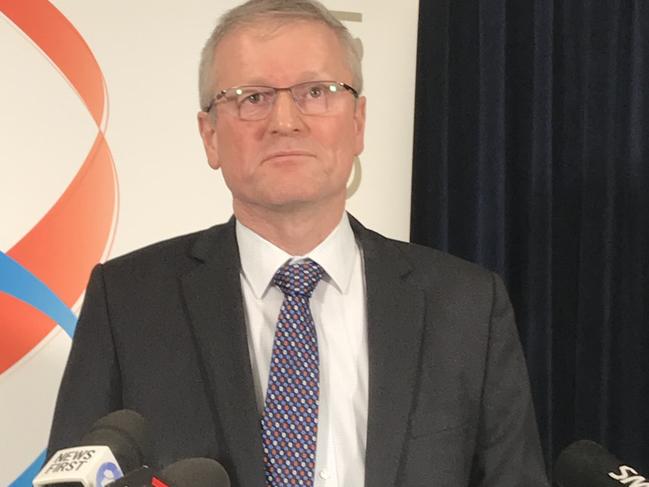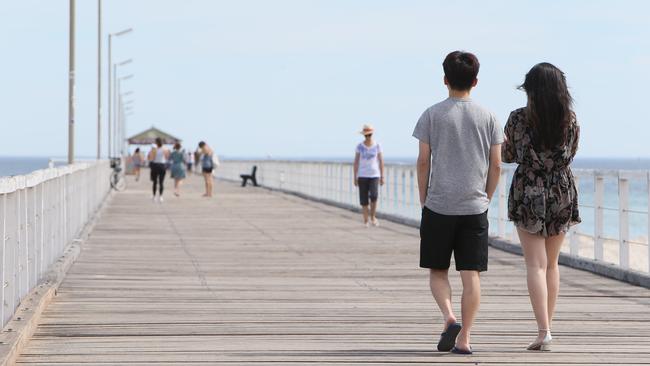State Government preparing for mental health toll from COVID-19 crisis to last for years
The post-traumatic stress caused by the coronavirus pandemic will last for years, and for some people, will come on top of devastating bushfires. The State Government is preparing for the fallout.
Coronavirus News
Don't miss out on the headlines from Coronavirus News. Followed categories will be added to My News.
South Australians must rally behind family, friends, colleagues and neighbours for the next several years to stop deep psychological trauma from the coronavirus pandemic, the state’s top mental health doctor warns.
The State Government is ramping up its mental health efforts and suicide prevention in a new “disaster response” as widespread economic turmoil costs countless jobs and leaves scores of businesses on the brink.
In an exclusive interview, SA Health’s chief psychiatrist, Dr John Brayley, warns that as more people suffer anxiety, fear and post-traumatic stress, the community toll – fuelled by the summer’s bushfire disaster – could last up to four years.
“We would hope to reduce the number of people who develop PTSD but even for those people who do, it is a condition that can be treated and our mental health response to COVID-19 isn’t … just for the next six months,” he told The Advertiser.
“It needs to be literally for three to four years.

“Early mental health treatment and care is an important part of recovery for some people and that is why keeping an eye out for symptoms, and not just accepting them if they are persistent.
“It is important if people are distressed, and in crisis, to seek help.”
Dr Brayley, the former Public Advocate appointed to his current role in May 2018, implored people to maintain a healthy lifestyle and routines, exercise as well as keep personal connections through technology to cope with restrictions and mounting anxiety.
Routines, and healthy eating, for children is critical, he said.
Parents should be honest with their children about their family’s situation and schooling but “maintain a sense of hope that the outbreak can be managed”.
Media consumption for young people should be managed to a minimum and only trusted sources viewed.
He said key mental health symptoms to be mindful of included people becoming irritable, suffering insomnia, having a lack of concentration, fatigue, dizziness and headaches.
“My message is that in these extraordinary times it is still possible to take action to look after one’s physical … and mental health,” he said.
“When people are isolated at home, maintaining a predictable routine is important. It quite clear that (when) people are exercising and eating well, it will have physical health benefits but (also) will help maintain their mental health.
“We know there are risks to people’s mental health through home isolation, and the fear associated with COVID-19, but there are strategies that people can take.
“For all of us, the areas of connection with others, maintaining routine, and looking after lifestyle are critical. We know that with isolation this creates added risks as people deal with fear and uncertainty in these times.”
He said that in some areas hit by bushfires it was “very important” for people to be extra vigilant about mental health.

“It is even more important because if people have been through a bushfire trauma, then have a second trauma, accumulative risk can be greater,” he said.
Acting on orders from Premier Steven Marshall, SA Health is developing specialised “disaster response plans” that will boost mental health services.
Extra support is in the pipeline including a new focus on technology such as video conferencing, Skype and Facetime.
At least 10 more beds – which can be further boosted to 20 – are being created at the Adelaide Clinic, a psychiatric hospital at Gilberton, while specialised literature and tips has also been created.
Dr Brayley, a former Australian Border Force chief medical officer, said while there was no immediate evidence of a spike in people taking their own lives, urgent medical help should be sought if any “problems persist or become intense”.
He said research into life post the 2002 SARS virus crisis found people developed post-traumatic stress disorder after being in quarantine, isolation or having contracted a viral infection.
“There is an increased (suicide) risk but this is a risk that we can respond to, both as a community and clinically,” he said.
“This is where support and contact is important. The risk relates to the fears associated with COVID-19 but also financial pressure is a factor. At this time we have not observed a particular pattern.
“But this is a risk that we all need to work to minimise and prevent. And we can do that as a community.”
SAHMRI offers free mental health check
A free mental health program has been put online by the South Australian Health and Medical Research Institute to help people cope with the stress and anxiety created by the COVID-19 pandemic.
The program usually costs about $320, but Joep van Agteren, research and development lead at SAHMRI’s Wellbeing and Resilience Centre said the organisation wanted to “play our part and help out like our health professionals are on the front line’’.
“We want this out there to as many people as possible as we want to reduce the mental health fall- out of this thing,’’ Mr van Agteren, pictured, said. “We also want people to realise that you can keep your wellbeing and positive spirit high in times like this.’’
Mr van Agteren said he feared the mental health fallout from the virus – with the social isolation, job losses and uncertainty – would be severe.
“The mental health fallout from this thing, in my opinion, is going to be massive,’’ he said.
The Be Well Plan – created in conjunction with Flinders University’s Orama Institute – runs for 10 hours over five sessions and will be online from Monday at bewellplan.com.
There is also a 15-minute questionnaire, which gives feedback and tips. It can also be retaken so a person can plot the progress of their mental health.
Mr van Agteren said the training focused on three key elements – “Where you are in life, what makes you, you’’, and then offers way to build your wellbeing.
“People can use it to deal with some of their anxieties around COVID, but people who are not too fussed about it can use it to improve their general mental health,’’ he said.
The Wellbeing and Resilience Centre will also offer facilitated sessions after the free course for a gold coin donation.
“I think it’s important for people to realise it’s OK to start feeling a little bit worried about the upcoming period,” Mr van Agteren said.
“But when you really start feeling your behaviour is changing, and you are less motivated, and you don’t want to come out of bed, and you don’t want to interact with people even socially through Facebook or through other social channels, it might be that the problems are a little more serious than you want to admit.’’
- Michael McGuire
